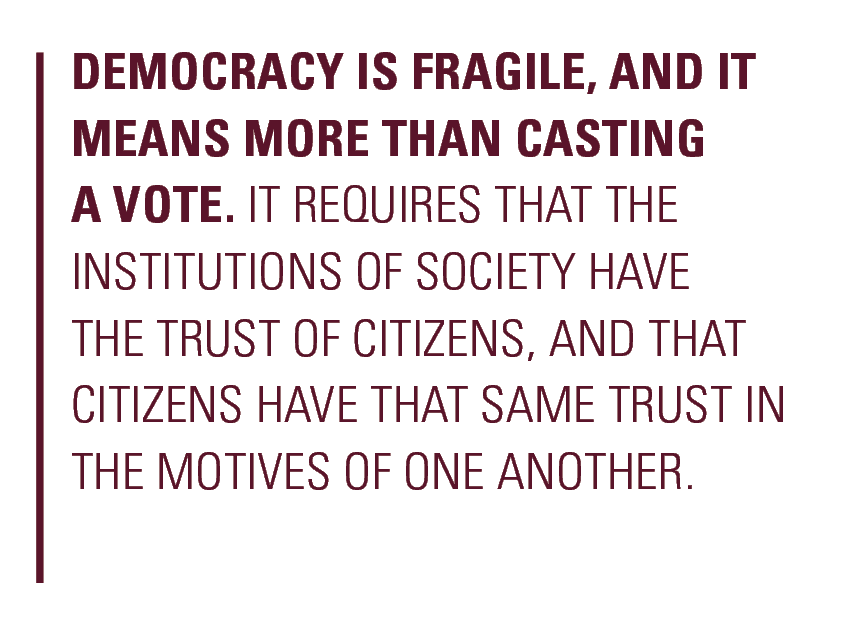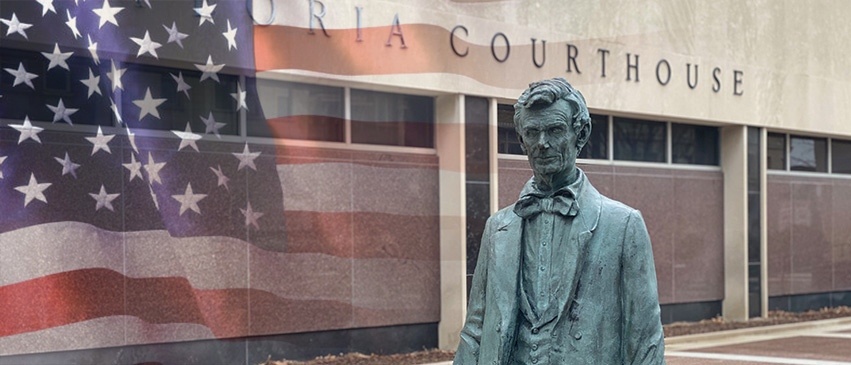After a rather unconventional presidential election season in 2020, we have our final results. Or do we? Former Vice President Joe Biden won the Electoral College with 306 votes to outgoing President Donald Trump’s 232 votes—a near-reversal of the 2016 results. With seven million more popular votes than his opponent, Americans should view the 2020 presidential election as a decisive victory for Joe Biden. Yet multiple polls have shown significant numbers of Republicans questioning or outright denying the election’s legitimacy. This has real-world consequences, as President Trump used these figures in an attempt to pressure election officials into decertifying their states’ election results. When that was not successful, his supporters staged an assault on the U.S. Capitol to prevent Congress from certifying the results, leading to an evacuation and lockdown of the building, as well as five deaths.
In 2016, 52 percent of Democrats said Hillary Clinton’s loss to Donald Trump was “legitimate and accurate,” in spite of Russian attempts to affect the election’s outcome. In 2020, only 26 percent of Republicans said they thought Trump’s loss was similarly legitimate. As a political scientist, I am incredibly alarmed by these numbers. To me, they demonstrate the poor state of American democracy.
A Dangerous Narrative
For generations, Americans have prided themselves on a deep commitment to democracy, so much so that we want other countries to embrace our ways of governing. Many Americans seem to venerate the Constitution as a document, and some have an almost religious perspective toward the founders who wrote it. However, the last few years—and this election in particular—have forced to me to question many Americans’ commitment to democracy.
With Joe Biden successfully assuming office as the 46th President of the United States on January 20, 2021, we have begun to see pundits and politicians claim that the guardrails of American democracy performed admirably, in spite of a president who repeatedly subverted democratic institutions and traditions during his time in office. I think this narrative is not only incorrect, but dangerous. It fails to recognize that American democracy is built on a foundation of norms, rather than codified laws. As informal but expected rules that govern the behavior of individuals and groups in societies, norms are why presidents place their assets into blind trusts to avoid conflicts of interest. There is no federal law requiring presidents to do so, yet Jimmy Carter surrendered control of his peanut farm without complaint. Citizens and politicians unofficially agreed that presidents should provide evidence that they were working for the American people and not their own personal enrichment. That is, at least until the election of 2016.
Historically, we have counted on politicians to restrain themselves out of fear of public consequences—public shaming, lowered approval ratings, loss of policy achievements, even losing elections. But as recent events have shown, the polarization and hyper-partisanship of our era have weakened those guardrails. Furthermore, I am unconvinced that those guardrails were particularly solid pieces of metal to begin with. Rather, it feels like they were gilded—covered in gold leaf on the outside, but insubstantial and flimsy at their core.
The Trump presidency was a tractor-trailer hydroplaning right through those guardrails. Objectively, the last administration engaged in serial dishonesty on matters both large and small. Also objectively, Trump’s dishonesty did not make him unsuccessful, as he just received over 74 million votes and helped the Republican Party outperform expectations down the ballot. Nevertheless, that dishonesty, most recently manifested in baseless claims of election rigging and voter fraud, means millions of Americans now doubt the legitimacy of the most recent presidential election and will not recognize Joe Biden as its rightful winner.
The Fragility of Democracy
A healthy democracy should not be viewed through the lens of winner-takes-all—such a narrow perspective triggers dangerous behaviors in people. If I always lose when you win, I will only see you as taking things from me and pushing me down. If I only win if you lose, I will do everything possible to stay in power and continue to reap the benefits. These mentalities are poisonous to a functioning democracy. We are far more likely to feel entitled to take immoral, unethical or even illegal steps to win if the alternative is abject loss.
Furthermore, we must never view being “democratic” as an endpoint. In political science research, many scholars investigate democratization—the process of becoming a democracy or of growing more democratic. We further discuss consolidated versus unconsolidated democracies. Consolidated democracies are seen as secure, having a long-term life expectancy, and being largely immune to threats of authoritarian regression. We often attribute these characteristics to the existence of norms and legal mechanisms that prevent potential “reverse waves.” In a consolidated democracy, democracy is “the only game in town.” For this to happen, democracy must be “routinized and deeply internalized in social, institutional, and even psychological life, as well as in calculations for achieving success” (Linz and Stepan, 1996).
It is difficult to tell when a democracy has consolidated. Generally, research has deemed older democracies (like the United States) consolidated because countries that have been democratic for extended periods of time are likely to exhibit and internalize the norms that make democracy more than simply functional and superficial. But a consolidated democracy would not have a president refusing to concede in light of a legitimately run election, nor a substantial portion of the population supporting that refusal. In a consolidated democracy, the losing candidate accepts the outcome of the election, urges his supporters to acknowledge (if not embrace) the incoming regime, and works to help their party win the next election.
In addition, there is serious debate as to how long the United States has been a democracy. Modern democratic regimes must have executives and legislatures chosen through free, fair and open elections. Virtually all adults must possess the right and ability to vote, with their civil rights and civil liberties guaranteed and actually protected.
While the United States declared its independence from Great Britain in 1776 and enforced its first governing document in 1781, no student of American history would call the United States as it existed at that time a democracy. And while the Civil War ended the formal institution of slavery, Black, Indigenous and female Americans still did not enjoy full citizenship rights. Given the necessities of the civil rights and women’s rights movements, the United States would not meet those democratic criteria until at least the 1960s. Indeed, there is room to argue we still do not fully meet those criteria even today.
All of this is to say that democracy, both in the United States and around the world, is fragile. And it means more than casting a vote. It requires that the institutions of society—media, political parties, interest groups and government—have the trust of citizens. It requires citizens have that same trust in the motives of one another. It requires near-universal suffrage and easily available mechanisms to participate. Unfortunately, the United States does not currently meet any of those demands. I do not believe American democracy (however defined or measured) is terminally ill, but I do believe it is very sick and in need of substantial treatment. Unfortunately, I do not have great recommendations for that treatment.
The Rule of Law
We are living in unprecedented times in which we not only interpret facts differently; we do not even agree on what constitutes truth. Yet, our nation and its institutions have survived threats before. The founders knew their plan for this country was imperfect, and we need to acknowledge that as well. We can no longer rely on norms to protect and insulate our democracy. We must take steps to codify those norms into law, and demand our elected officials and judiciaries enforce those codifications.
When Joe Biden was sworn into office on January 20, 2021, our democracy once again survived by the skin of its teeth. But we must stop assuming that will always be the case. Our luck will wear out at some point, and we need to have legal protections in place to combat that inevitability. PM
Megan Remmel is an assistant professor in the Political Science Department at Bradley University.




